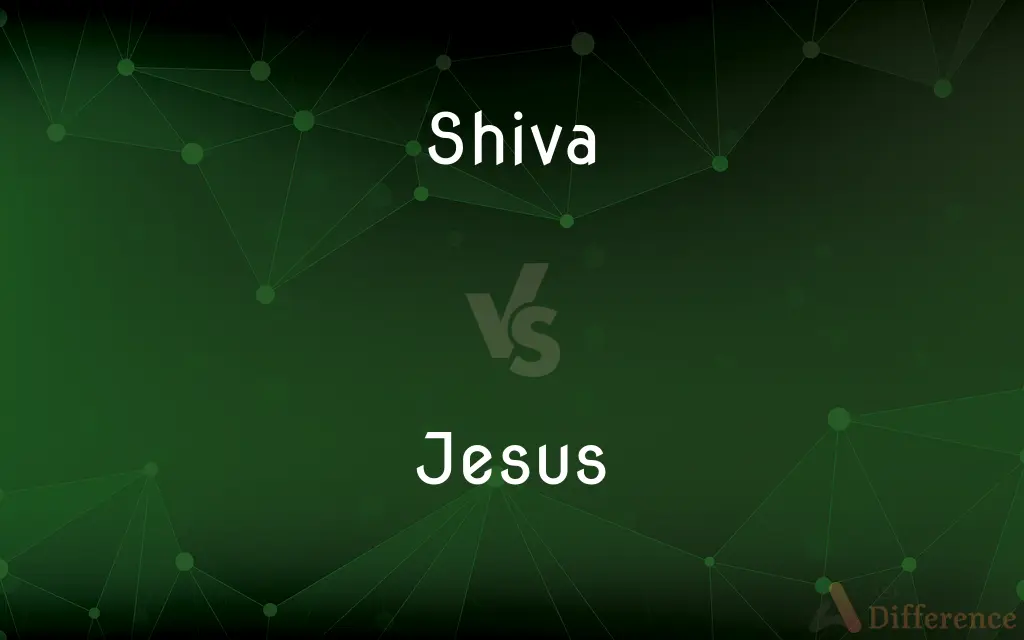Shiva vs. Jesus — What's the Difference?
By Fiza Rafique & Maham Liaqat — Updated on March 29, 2024
Shiva, a principal deity in Hinduism, represents destruction and renewal, while Jesus, central to Christianity, embodies love, redemption, and the promise of eternal life.

Difference Between Shiva and Jesus
Table of Contents
ADVERTISEMENT
Key Differences
Shiva is one of the principal deities of Hinduism, known for his role in the destruction and transformation of the universe, which is a part of the natural cycle leading to renewal. Whereas, Jesus Christ is the central figure of Christianity, revered as the Son of God and the savior of humanity, whose teachings and sacrifice on the cross offer redemption and the hope of eternal life.
In Hinduism, Shiva is often depicted with a trident, a crescent moon, a third eye, and is associated with the ascetic life, meditating on Mount Kailash. On the other hand, Jesus is commonly represented with a cross, symbolizing his crucifixion, and is often portrayed as a shepherd, guiding and protecting his followers.
Shiva is celebrated in various forms and through numerous festivals in Hindu culture, such as Maha Shivaratri, where devotees observe fasting and offer prayers. Jesus's life and teachings are commemorated in Christian practices and holidays, notably Christmas, marking his birth, and Easter, celebrating his resurrection.
The concept of Shiva encompasses a complex philosophy that includes aspects of a creator, protector, and destroyer, reflecting the cyclical nature of the universe. Whereas, Jesus's message centers on love, forgiveness, and the kingdom of God, emphasizing a personal relationship with the divine and ethical living.
Worship practices for Shiva include offerings, hymns (stotras), and the anointment of Lingam (a symbol of Shiva), highlighting the deity's omnipresence and transcendence. In contrast, Christian worship involves prayer, sacraments such as the Eucharist, and reading the Bible, focusing on communal worship and personal devotion.
ADVERTISEMENT
Comparison Chart
Role in Religion
Destroyer and Renewer
Savior and Redeemer
Symbolism
Trident, Third Eye
Cross, Shepherd
Key Festivals
Maha Shivaratri
Christmas, Easter
Philosophical Aspect
Cycle of Creation and Destruction
Love, Redemption, Eternal Life
Worship Practices
Offerings, Lingam Anointment
Prayer, Eucharist
Compare with Definitions
Shiva
Shiva's representation includes a third eye, symbolizing insight and wisdom.
Shiva's third eye opened to quell the chaos caused by desire and pride.
Jesus
Easter celebrates the resurrection of Jesus, a cornerstone of Christian belief.
Easter services commemorate Jesus's resurrection and the hope it brings to believers.
Shiva
The Lingam is a symbol of Shiva, revered in temples and shrines.
Worshippers pour milk over the Lingam, honoring Shiva in a sacred ritual.
Jesus
The concept of the Holy Trinity in Christianity includes Jesus as the Son of God.
The Trinity represents God as Father, Son (Jesus), and Holy Spirit, in one divine essence.
Shiva
As the lord of meditation, Shiva embodies ascetic values.
Devotees seek to emulate Shiva's focus and meditation techniques for spiritual growth.
Jesus
Jesus Christ is central to Christianity as the incarnation of God and savior.
Christians believe that Jesus was crucified, died, and rose again for humanity's salvation.
Shiva
Shiva is a major Hindu deity symbolizing destruction and renewal.
In Hindu mythology, Shiva's dance represents the cosmic cycles of creation and dissolution.
Jesus
Jesus's teachings emphasize love, compassion, and forgiveness.
The parables of Jesus often teach lessons about mercy and forgiveness.
Shiva
Maha Shivaratri is a significant festival dedicated to Lord Shiva.
During Maha Shivaratri, devotees fast and perform night-long vigils to honor Shiva.
Jesus
The cross is a paramount symbol of Jesus's sacrifice and Christian faith.
The cross represents Jesus's suffering and victory over death.
Shiva
Shiva (; Sanskrit: शिव, lit. 'The Auspicious One' [ɕɪʋɐ] (listen), IAST: Śiva), also known as Mahadeva (; Sanskrit: महादेव:, lit. 'The Great God'), is one of the principal deities of Hinduism. He is the Supreme Being in Shaivism, one of the major traditions within Hinduism.Shiva has pre-Vedic tribal roots, and the figure of Shiva as we know him today is an amalgamation of various older non-Vedic and Vedic deities, including the Rigvedic storm god Rudra who may also have non-Vedic origins, into a single major deity.Shiva is known as "The Destroyer" within the Trimurti, the triple deity of supreme divinity that includes Brahma and Vishnu.
Jesus
Jesus (Greek: Ἰησοῦς, romanized: Iēsoûs, likely from Hebrew/Aramaic: יֵשׁוּעַ, romanized: Yēšūaʿ), c. 4 BC – AD 30 / 33, also referred to as Jesus of Nazareth or Jesus Christ, was a first-century Jewish preacher from Judea. He is the central figure of Christianity, the world's largest religion.
Shiva
One of the principal Hindu deities, worshiped as the destroyer and restorer of worlds and in numerous other forms. Shiva is often conceived as a member of the Trimurti, along with Brahma and Vishnu.
Jesus
The central figure of the Christian religion.
Shiva
A seven-day period of formal mourning observed after the funeral of a close relative.
Jesus
The Savior; the name of the Son of God as announced by the angel to his parents; the personal name of Our Lord, in distinction from Christ, his official appellation.
Thou shalt call his name Jesus; for he shall save his people from their sins.
Jesu, do thou my soul receive.
Shiva
(Judaism) A weeklong period of formal mourning for a close relative.
Jesus
AD 29)
Shiva
(Judaism) a period of seven days of mourning after the death of close relative;
The family is sitting shiva
Shiva
The Destroyer; one of the three major divinities in the later Hindu pantheon
Common Curiosities
Who is Jesus?
Jesus Christ is the central figure of Christianity, believed to be the Son of God and the savior of humanity.
How do the teachings of Shiva and Jesus compare?
Shiva's teachings are more focused on the cyclical nature of the universe and asceticism, while Jesus's teachings emphasize love, forgiveness, and salvation.
How do Shiva and Jesus differ in religious symbolism?
Shiva is often associated with symbols like the trident and third eye, representing power and insight, while Jesus is symbolized by the cross and shepherd, denoting sacrifice and guidance.
Who is Shiva?
Shiva is a principal deity in Hinduism, representing destruction and renewal as part of the universe's natural cycle.
What are the key festivals for Shiva and Jesus?
For Shiva, Maha Shivaratri is a significant festival, whereas for Jesus, Christmas and Easter are central religious holidays.
What philosophical aspects do Shiva and Jesus represent?
Shiva represents the philosophical aspects of the cyclical nature of the universe, while Jesus embodies love, redemption, and the promise of eternal life.
What is the significance of the cross in Christianity?
The cross symbolizes Jesus's crucifixion and the redemption of humanity's sins.
What does the resurrection of Jesus signify in Christianity?
The resurrection of Jesus signifies his victory over death and the promise of eternal life for believers.
What is Easter, and why is it important?
Easter is a Christian holiday celebrating Jesus's resurrection, underscoring the central belief in life after death and redemption.
How do the teachings of Shiva and Jesus influence their followers?
The teachings of Shiva encourage meditation, detachment, and understanding the transient nature of the universe, while Jesus's teachings guide followers towards love, compassion, and ethical living.
What role does meditation play in worshiping Shiva?
Meditation is a key aspect of worshiping Shiva, reflecting his role as the lord of meditation and ascetic practices.
How do Hindus worship Shiva?
Hindus worship Shiva through offerings, hymns, and the anointment of the Lingam, among other practices.
What is the Lingam, and why is it important in worshiping Shiva?
The Lingam is a symbol representing Shiva, important in worship for its embodiment of the divine's omnipresence and transcendence.
How is Jesus's message relevant today?
Jesus's message of love, compassion, and forgiveness continues to influence ethical and moral standards in contemporary society.
Can Shiva be considered a god of destruction only?
No, Shiva's role as a destroyer is also linked to renewal and regeneration, making him a complex deity embodying destruction as part of the creation cycle.
Share Your Discovery

Previous Comparison
Hootenanny vs. Hoedown
Next Comparison
Melophile vs. MelomaniacAuthor Spotlight
Written by
Fiza RafiqueFiza Rafique is a skilled content writer at AskDifference.com, where she meticulously refines and enhances written pieces. Drawing from her vast editorial expertise, Fiza ensures clarity, accuracy, and precision in every article. Passionate about language, she continually seeks to elevate the quality of content for readers worldwide.
Co-written by
Maham Liaqat













































